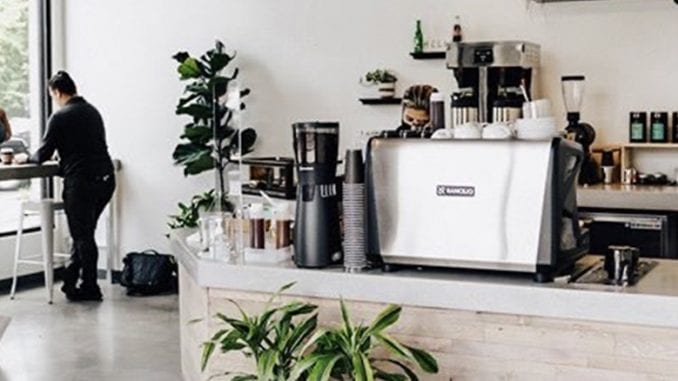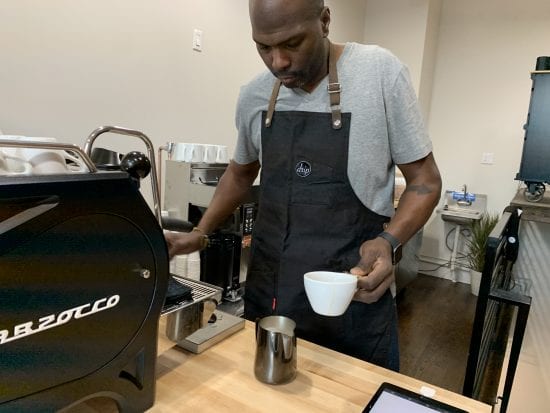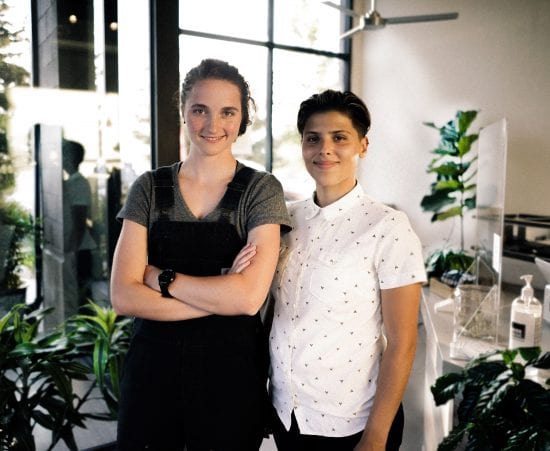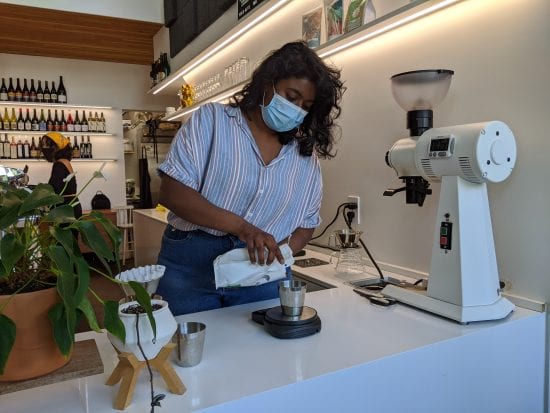
Three U.S. cafés talk about the risks and rewards of opening during a pandemic.
BY MARK VAN STREEFKERK
BARISTA MAGAZINE ONLINE
Cover photo by @portlandcoffeeshops
Now six months into a global health crisis, it’s clear that COVID-19 will be with us for the foreseeable future. Instead of us putting life on pause for a few months, COVID-19 has just become part of our new normal. While it might still seem like a risky time to open a café—especially with so many established ones temporarily or permanently closed, massive unemployment, and of course health and safety concerns—these three U.S. cafés opened in or around March of 2020, when many states were mandating stay-at-home measures. Today we take a look at Drip Coffee Makers in New York, JoJo’s Java in Tigard, Ore., and Union Coffee in Seattle, and learn about the challenges and rewards of opening in a pandemic.

Nigel Price, founder of Drip Coffee Makers, left the financial world around the mortgage crisis of 2008, about the same time he was exposed to specialty coffee. “After more than a decade in finance I realized I needed to focus more on my mental, spiritual, and physical health, not just my savings account,” Nigel says.
He started out with a coffee push cart outside of the Brooklyn Museum and Botanical Garden. The success of the cart led to a brick-and-mortar café in the Bushwick/Bed-Stuy neighborhood of Brooklyn in New York on January 20, Martin Luther King Jr. Day. When the COVID-19 pandemic called for stay-at-home measures in New York, Price was admittedly unsure about the café’s future. “I didn’t expect Drip to survive COVID, so my only intention was to be whatever my neighbors needed me to be. And what I received in return was all of the love I put out as they’ve all reciprocated by supporting my business, and we’ve never had to close or even reduce hours,” he says.
Until recently, Drip has been a one-man operation, but Nigel has been able to hire on additional help. He says that “(identifying) what your customers’ needs are and meet(ing) them where they are” has made all the difference. Drip’s retail coffee and brewing equipment have been big sellers, and those who order to-go are “so happy to have a temporary respite from the home/office, even if only for five minutes.”

In Tigard, Ore., JoJo’s Java opened the first week of March, and manager Hope Hines credits their ability to stay open to their community of customers and supportive neighboring cafés. “The community is what’s going to help us stay alive. That’s always the factor. We can’t do it without our community,” she says.
Being such a new café, closing temporarily wasn’t financially feasible for JoJo’s at the beginning of the pandemic. Hope runs the café with only her partner, Jamie Kay Christianson, and is careful to follow all state guidelines, including meticulous sanitizing, face masks for themselves and customers, and indicating proper social distancing at the café with tape. JoJo’s also has a garage door opening, which encourages customer flow throughout the café.
Hope’s networks with other coffee shops in Oregon and Vancouver, Wash., have been an important part of how she stays informed during COVID-19. Adjusting to a pandemic felt less overwhelming as Hope realized so many others were in the same boat. “It was really hard at first, and then everyone started trying to figure it out, and we’re still trying to. Being able to have that conversation of ‘How are you doing it?’”
Hope’s advice for any fledgling coffee business during COVID-19 is, “Don’t be afraid. There are amazing communities out there that definitely want to support people who are business owners. I’m a woman, I’m Pureto Rican, and I have a lot of people who want to support me just because of that, which is amazing. … Just try … COVID’s probably always going to be here, we just need to find that new normal.”

Union Coffee owner Geetu Vailoor certainly wasn’t planning on taking over a café at the beginning of a pandemic, but that’s just what happened. Geetu, formerly the coffee educator and wholesale manager at Boon Boona Coffee, was approached by Union Coffee owner Zack Reinig in February with an offer. “He told me, ‘I wanna step away from my café. Would you wanna do this?’” Geetu explains. At the time, she was in the midst of several personal and professional transitions, and the thought of taking over a café felt like too much. The more Geetu sat with the thought, however, the more it seemed like the right thing to do.
“As time went by, I realized there was not really a workplace environment that would really suit me. It dawned on me: ‘I’m going to take this opportunity even though it’s super risky. I’ve never run a business before … I never expected to be a café owner, but I also realized that there’s not really a lot of spaces for a queer woman of color to really succeed and make more than minimum wage for a lot of labor, or make a space that feels safe.”
In a turnkey operation, Geetu assumed ownership of Union on March 19, right as Washington’s stay-at-home mandate went into effect. Around that time, she “struggled a lot with not wanting to encourage people to leave their homes during COVID, but realize(d) I needed to make income … I just felt like, I’m gonna be sitting at home anyways, I might as well sit at the café and see if people walk in.”
Since those early days, Geetu gradually added a few more baristas, and invited Juice Club, a natural wine bottle shop, to share the space. With the help of Oatly, Geetu was able to host antiracism training for the team. Even if the move was risky, taking over a formerly white-owned café in the middle of COVID-19 was a chance to create more of the inclusive coffee community Geetu wanted to see.

ABOUT THE AUTHOR
Mark Van Streefkerk is Barista Magazine’s social media content developer and a frequent contributor. He is also a freelance writer, social media manager, and novelist based out of Seattle. If Mark isn’t writing, he’s probably biking to his favorite vegan restaurant. Find out more on his website.
